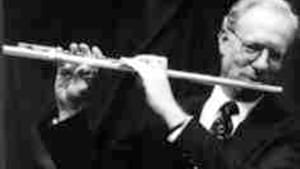Stay in the Loop
BSR publishes on a weekly schedule, with an email newsletter every Wednesday and Thursday morning. There’s no paywall, and subscribing is always free.
The neurologist plays the flute, or: A musician's case for dual careers
Musicians with two careers: Pro or con?

The pianist and writer David Dubal, who taught me piano literature in graduate school, once listed at least 25 concertos that every pianist should play (on top of everything else we're expected to know). A few weeks later this same teacher urged us aspiring concert pianists to spend more time away from our practice rooms, experiencing life.
Dubal's contradictory edicts illustrate a dilemma faced by all performers. We must practice constantly in order to be technically sound enough to handle the many challenges composers throw at us. But if our experience is too narrow, our playing will lack depth and passion. Who will want to hear our interpretation if our existence is so cloistered that we have nothing musically interesting to say? True artists must feed their passion for art with a passion for life in general.
I am thinking here of Carl Ellenberger, who has managed to combine a successful medical career (as a neurologist) with enough musical skill to have been principal flutist in several orchestras, beginning when he was preparing for medical school. As a student of Joseph Mariano at Eastman School of Music, Ellenberger never thought of giving up flute for medicine or vice versa. Medicine, he says, allowed him to avoid teaching music to "indifferent students" (among other things musicians do to pay the bills). And music helped him survive the stress of medical school.
In addition, he has told me, "As a tenderfoot doctor at the bottom of the medical hierarchy, when the vast universe of medicine seemed overwhelming, regular calls for my services as a professional musician did wonders for my self-confidence."
Feeding passion
As a concert pianist who also enjoys writing, I can't say that my dual careers have been as intense as Dr. Ellenberger's. But I can relate to the idea that one passion can simultaneously feed and relieve the stress from the other. When your job is to interpret another person's creations, sometimes it can be liberating to create your own universe. (On the other hand, not having to create the universe has its appeal, too.)
Sometimes it helps an artist to find a passion that's outside the arts altogether, as Dr. Ellenberger has done in medicine. While preparing to participate in a concert at Weill Hall in New York, I was very nervous, even though I'd spent more than enough time rehearsing. Having to focus on feeding my children and getting them ready for bedtime prior to walking to Carnegie Hall from my hotel centered me. The music was still important, but there was something grounding about the act of doing a job that didn't require high-wire intensity, as performing can.
Perceived as a dilettante
Many successful musicians have also developed equally successful careers outside of music— the composers Charles Ives and Robert Schumann (insurance executive and journalist, respectively), the pianist Ignacy Jan Paderewski (Polish statesman), the flutist Paula Robison and the violinist Arnold Steinhart (both as authors). But dual careerists pay a price.
Carl Ellenberger acknowledges that he might have been greater at either of his professions/passions had he focused on one or the other. He founded the summer-long Music at Gretna festival in central Pennsylvania and performs regularly there, along with an array of world-class artists. While no one has ever complained about his performances, he says, he's sure that some professional musicians view him as a dilettante.
Failed marriages
Two of his marriages failed— casualties, at least in his assessment, of his combining music and medicine. But he expresses no regrets: Being both a doctor and a flutist, he says, has made his life richer. (As someone whose primary source of income is music, I suspect medicine has made his bank account richer, too.)
For me, being a musician, writer, and single mother of two is about juggling— which, in my case, means I sometimes drop the ball. The times when I feel I'm performing equally well in all areas are fleeting. Still, I can't imagine my life without one of my passions.
Should I give up my writing for my music? Should I give up my music for my family? Why on earth would I want to— especially when each passion feeds the other?♦
To read responses, click here and here.
Dubal's contradictory edicts illustrate a dilemma faced by all performers. We must practice constantly in order to be technically sound enough to handle the many challenges composers throw at us. But if our experience is too narrow, our playing will lack depth and passion. Who will want to hear our interpretation if our existence is so cloistered that we have nothing musically interesting to say? True artists must feed their passion for art with a passion for life in general.
I am thinking here of Carl Ellenberger, who has managed to combine a successful medical career (as a neurologist) with enough musical skill to have been principal flutist in several orchestras, beginning when he was preparing for medical school. As a student of Joseph Mariano at Eastman School of Music, Ellenberger never thought of giving up flute for medicine or vice versa. Medicine, he says, allowed him to avoid teaching music to "indifferent students" (among other things musicians do to pay the bills). And music helped him survive the stress of medical school.
In addition, he has told me, "As a tenderfoot doctor at the bottom of the medical hierarchy, when the vast universe of medicine seemed overwhelming, regular calls for my services as a professional musician did wonders for my self-confidence."
Feeding passion
As a concert pianist who also enjoys writing, I can't say that my dual careers have been as intense as Dr. Ellenberger's. But I can relate to the idea that one passion can simultaneously feed and relieve the stress from the other. When your job is to interpret another person's creations, sometimes it can be liberating to create your own universe. (On the other hand, not having to create the universe has its appeal, too.)
Sometimes it helps an artist to find a passion that's outside the arts altogether, as Dr. Ellenberger has done in medicine. While preparing to participate in a concert at Weill Hall in New York, I was very nervous, even though I'd spent more than enough time rehearsing. Having to focus on feeding my children and getting them ready for bedtime prior to walking to Carnegie Hall from my hotel centered me. The music was still important, but there was something grounding about the act of doing a job that didn't require high-wire intensity, as performing can.
Perceived as a dilettante
Many successful musicians have also developed equally successful careers outside of music— the composers Charles Ives and Robert Schumann (insurance executive and journalist, respectively), the pianist Ignacy Jan Paderewski (Polish statesman), the flutist Paula Robison and the violinist Arnold Steinhart (both as authors). But dual careerists pay a price.
Carl Ellenberger acknowledges that he might have been greater at either of his professions/passions had he focused on one or the other. He founded the summer-long Music at Gretna festival in central Pennsylvania and performs regularly there, along with an array of world-class artists. While no one has ever complained about his performances, he says, he's sure that some professional musicians view him as a dilettante.
Failed marriages
Two of his marriages failed— casualties, at least in his assessment, of his combining music and medicine. But he expresses no regrets: Being both a doctor and a flutist, he says, has made his life richer. (As someone whose primary source of income is music, I suspect medicine has made his bank account richer, too.)
For me, being a musician, writer, and single mother of two is about juggling— which, in my case, means I sometimes drop the ball. The times when I feel I'm performing equally well in all areas are fleeting. Still, I can't imagine my life without one of my passions.
Should I give up my writing for my music? Should I give up my music for my family? Why on earth would I want to— especially when each passion feeds the other?♦
To read responses, click here and here.
Sign up for our newsletter
All of the week's new articles, all in one place. Sign up for the free weekly BSR newsletters, and don't miss a conversation.
 Maria Thompson Corley
Maria Thompson Corley